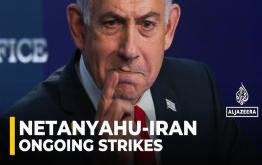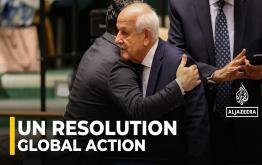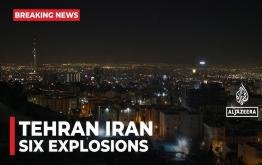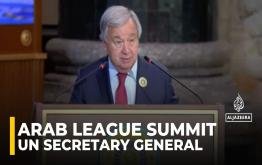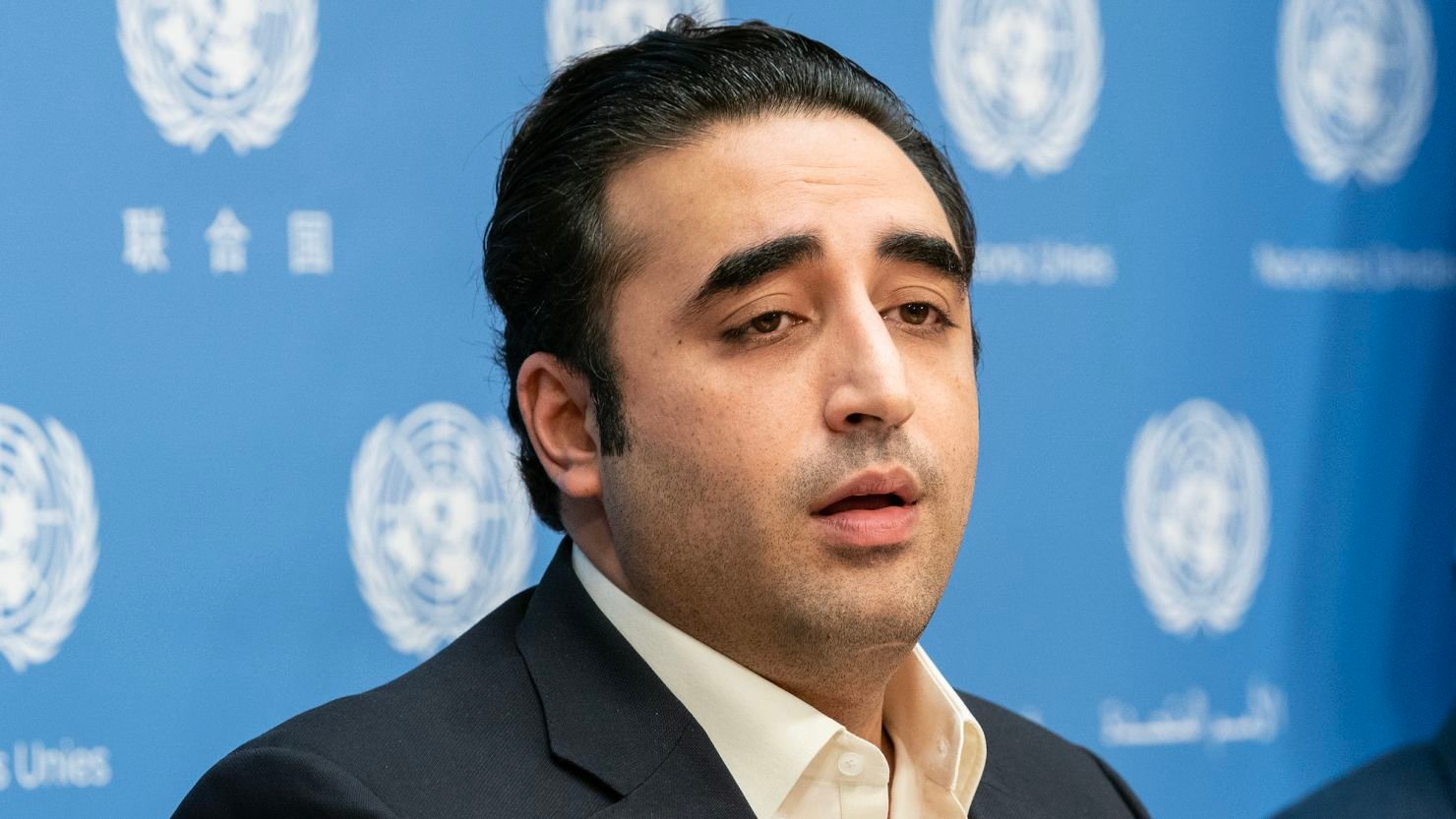
Pakistan’s Bilawal Bhutto Zardari: International community ‘must intervene’
Pakistan’s Bilawal Bhutto Zardari: International community ‘must intervene’
India’s former defence minister calls attack on Pakistan ‘much-needed lesson’
Sharad Pawar, a former defence minister who heads India’s Nationalist Congress Party, has said he is “very happy” with India’s military action against Pakistan.
“It was a much-needed lesson,” Pawar told The Indian Express, claiming India’s government took steps to avoid civilian casualties. “I am very happy at the steps taken by the Indian government.”
Asked whether India should reach out to Pakistani politicians amid the crisis, he replied: “This is not the time.”
Pakistan foreign minister says India’s ‘cowardly action’ violates ‘UN Charter’
The Pakistani government says the country’s Foreign Minister Mohammad Ishaq Dar held a phone call with Italian Interior Minister Matteo Piantedosi and briefed him on “India’s recent escalatory measures”.
Ishaq Dar “stated that Pakistan strongly condemned India’s cowardly action, which was a flagrant violation of the UN Charter, international law, and established norms of inter-state relations”, the Foreign Ministry said in a statement.
It added that Ishaq Dar also “shared that Pakistan had exercised restraint but India, with its blatant disregard for international law, continued to threaten regional peace”.
Afghanistan’s Taliban government warns crisis jeopardises regional security
In a statement on X, the Taliban government’s Foreign Ministry has urged both India and Pakistan “to exercise restraint and resolve their issues through dialogue and diplomacy”.
“Security and stability serve the collective interest of all countries in the region,” it said, noting that escalating tensions between India and Pakistan run counter to those interests.
Relations between Afghanistan and neighbouring Pakistan have been strained over security concerns and Islamabad’s deportation campaign, which has expelled tens of thousands of Afghans since the beginning of April.
Pakistan unlikely to respond with attack beyond Indian-administered Kashmir
Federica Marsi
Islamabad is unlikely to opt for a retaliatory attack beyond Indian-administered Kashmir, Pakistani political commentator Shahid Hussain told Al Jazeera, although it will seek to reaffirm its readiness to respond to any aggression without provoking an escalation.
“Pakistan has effectively conveyed that any further escalation will be met with a proportionate response,” he said. “The message is clear: Pakistan reserves the right to strike back if provocations persist.”
Hussain also said that “Pakistan has questioned how it could be responsible for a terror attack while simultaneously being targeted by external destabilisation efforts.”
“Pakistan is victim of terrorism itself, how can a country which is a victim of terrorism themselves go into Indian-administered Kashmir and carry out an attack itself?” the analyst said.
All options on the table as Pakistan expected to retaliate
Osama Bin Javaid, Reporting from Islamabad, Pakistan
Pakistan is expected to retaliate within the next 24 to 48 hours, and that’s something we’ve been hearing from politicians across the board. They’re citing Article 51 of the United Nations Charter, which says that a country has the right to respond to an unprovoked act of aggression.
The defence minister said all options were on the table and that Pakistan has shown India that it is not only a nuclear power but also has conventional capabilities. Pakistan sees India’s attack as a military escalation by its government, and it will, therefore, continue hitting military infrastructure.
We’ve also been hearing fiery speeches from the Pakistani prime minister, foreign minister and others who say that India did not provide any of the evidence that it purports to have that it hit terrorist training camps but instead hit mosques and civilians.
New India-Pakistan military confrontation
Indian and Pakistani forces have been exchanging fire across the contested frontier between Indian and Pakistan-administered Kashmir, after India launched overnight strikes into Pakistan.
Several mosques attacked in India’s strikes
Pakistani officials have criticised the attacks on the mosques, including the Bilal Mosque near Muzaffarabad, and the Abbas Mosque in Kotli, both in Pakistan-administered Kashmir.
Images shared on social media and verified by Al Jazeera’s Sanad fact-checking agency show the aftermath of the attacks on the mosques.
Three civilians are reported to have been killed in the strikes on the Bilal Mosque.
“We must remember that India targeted mosques in Pakistan,” said Pakistan Army spokesperson Lieutenant General Ahmed Sharif Chaudhry. “Targeting mosques and places of worship reflects the narrow-minded thinking that grows under the dominance of Hindutva (ideology) adopted by Modi’s government, where minorities, especially Muslims, are deprived of their religious freedom and targeted.”
Some flight routes between Lahore-Islamabad to stay closed another day
As we reported earlier, Pakistan’s Airports Authority has announced the country’s airspace is back open.
The Civil Aviation Authority (CAA) has also issued a notice confirming the re-opening, according to Pakistan’s DAWN newspaper. While airspace is available for all major flight routes, the CAA clarified that a few routes between Lahore and Islamabad would stay closed for another day, reported DAWN.
“Flights arriving or departing from Islamabad International Airport must contact Islamabad Air Traffic Control (ATC) before operating their engines to ensure clearance,” according to the report.
Information war: Are India or Pakistan telling the truth about attacks?
After India’s overnight attacks on Pakistan and Pakistan-administered Kashmir, a parallel war has broken out – over information.
Within hours of the Indian strikes, authorities on both sides put out claims and counterclaims that have been amplified on social media, with each country trying to control the narrative in its favour.
Indian capital goes dark amid drill
Several Indian news outlets have reported that power was cut off for 15 minutes in parts of New Delhi, including the area housing the parliament and India Gate, as part of an emergency readiness drill.
The Indian Express described the blackout as an “unprecedented sight”.
Pakistan’s defence minister warns of threat of nuclear war
Defence Minister Khawaja Asif says if India imposes an all-out war on the region, it may lead to nuclear escalation.
“If India pushes the region toward nuclear war, it will bear the full consequences,” Asif told Geo News.
Azerbaijan condemns Indian attack
Azerbaijan’s Foreign Ministry says the country is concerned about further escalation between India and Pakistan, calling for resolving the conflict through diplomatic means.
“We condemn the military attacks against the Islamic Republic of Pakistan, which resulted in the death and injury of several civilians,” the ministry said in a statement.
‘If Pakistan responds, India will respond’
That’s what India’s Foreign Secretary Vikram Misri told 13 foreign envoys in New Delhi, according to Reuters.
Pakistan had earlier promised to respond to India’s strikes against it “at a time, place and manner of its choosing to avenge the loss of innocent Pakistani lives and blatant violation of its sovereignty”.
“Given the scale of the Indian strike, which was far greater than what we saw in 2019, we can expect a sizable Pakistani response,” Michael Kugelman, a Washington-based South Asia analyst and writer told Reuters.
Pakistan FM calls for holding India accountable for ‘reckless conduct’
Pakistani Foreign Minister Mohammad Ishaq Dar has briefed foreign ambassadors in Islamabad about the crisis with India.
“He rejected the baseless Indian claims of targeting terrorist infrastructure,” the Pakistani Foreign Ministry said in a statement.
“He maintained that there was no credible evidence linking Pakistan with the Pahalgam Attack.”
Ishaq Dar also “urged the international community to hold India accountable for its irresponsible and reckless conduct”, the ministry said.
Pakistan’s former foreign minister says India threatening peace of ‘all South Asia’
Al Jazeera spoke with Pakistan’s former Foreign Minister Bilawal Bhutto Zardari about the country’s latest military confrontation with India and his view on the path ahead.
Bhutto Zardari, now the chairman of the Pakistan People’s Party, said Pakistan does not seek war, but has the right to defend itself after India’s overnight aerial assault.
“What choice does Pakistan have? Innocent civilians have been killed. Our sovereignty has been violated,” he told Al Jazeera. “We’ve never pursued the path to conflict. But India is making it very difficult. And they’re once again threatening the peace and stability in all of South Asia.”
Bhutto Zardari stressed that Pakistan played no role in the April 22 attack in Indian-administered Kashmir that New Delhi has accused it of being behind, and pressed for an international inquiry to shed light on the facts.
“Our hands are clean and we’d like to get to the bottom of this,” said Bhutto Zardari. “Why did India reject Pakistan’s proposal for an international, impartial investigation into the incident …They still to this day have been unable to name to us, to tell us or anybody else those who are involved in these attacks, despite Pakistan’s calls for an international inquiry.”
More from Pakistan’s Bhutto Zardari: International community ‘must intervene’
Pakistan’s former Foreign Minister Bilawal Bhutto Zardari says the India-Pakistan crisis requires international mediation because of its global implications.
“I do call on the international community to play their role because this is not just a bilateral issue, this is a global issue,” he told Al Jazeera. “It’s a potential global crisis between two nuclear-armed neighbours. They must intervene and ensure India is held accountable for these actions, that sanity prevails in Delhi.”
Pakistani military says 31 civilians killed in Indian attack
Ahmed Sharif Chaudhry, the spokesperson for Pakistan’s armed forces, says the Indian assault has killed 31 civilians and injured dozens others.
“Any condemnation of India’s strikes is not enough,” Chaudhry was quoted as saying by the newspaper Dawn.
“The strikes of May 6 and 7 expose India’s disgusting face, showing that our enemy is so weak and scared that, like cowards, it targets civilians and population centres in the darkness of night instead of fighting the equivalent army in front of it.”
Prominent Indian spiritual guru backs attacks on Pakistan
Gurudev Sri Sri Ravi Shankar, founder of the Art of Living Foundation, has expressed support for the Indian military operation in Pakistan.
“India has been wise in just targeting only the terrorist camps who are not ready for any reasoning or dialogue. They are doing the right thing,” the spiritual guru, a self-described peacemaker, said in a video to his 3.4 million followers on Instagram.
Pakistan has said the Indian attacks killed civilians and did not target “terrorist camps” as claimed.
Shankar urged Indians who may be anxious to stay “calm” and “have patience”, saying Modi is “taking wise decisions”.
Pakistan ‘trying to avoid’ full-fledged war: Defence minister
Khawaja Asif calls the Indian assault an “invitation to expand the conflict”.
Asif told CNN that his country is “trying to avoid” an all-out war with India but must be prepared for one.
“We cannot be caught with our guards down,” he said.









